Share

The Ancients
Ravenna and the Fall of Rome
The fall of the Western Roman Empire stands as one of the most monumental moments in ancient history, symbolising the end of centuries of Roman dominance in the Mediterranean. However, amidst the crumbling of Rome, the city of Ravenna emerged as a prominent center, eventually surpassing Milan as the new capital. This begs the question: how did Ravenna attain such significance, and what insights can we glean from the art and architecture that remain there today, particularly from the 5th and 6th centuries?
In this episode, Tristan invites Professor Judith Herrin on to the podcast, to delve into the rise and fall of Ravenna's prominence. Together, they explore its intricate connections with the Western Roman Empire, its interactions with notable entities like the Goths, and the awe-inspiring Christian architecture that adorned its landscape. What can we learn from uncovering the secrets of Ravenna, why did it hold such immense importance?
Discover the past on History Hit with ad-free original podcasts and documentaries released weekly presented by world renowned historians like Dan Snow, Suzannah Lipscomb, Lucy Worsely, Matt Lewis, Tristan Hughes and more. Get 50% off your first 3 months with code ANCIENTS. Download the app on your smart TV or in the app store or sign up at here.
You can take part in our listener survey here.
If you'd like to learn even more, we have hundreds of history documentaries, ad free podcasts and audiobooks at History Hit - subscribe today! To download, go to Android or Apple store
More episodes
View all episodes
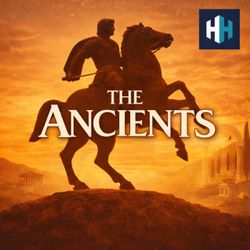
632. The Invasion of Persia | Alexander the Great
01:04:55||Ep. 632In spring 334 BC, a young Macedonian king sets out to conquer the Persian Empire.Tristan Hughes and Dr Adrian Goldsworthy explore Alexander the Great’s early campaigns, from the daring crossing into Asia to incredible victories. They discuss Alexander's strategic genius, respect toward Persian royalty, and how these triumphs forged his path to legend.MOREThe PersiansListen on AppleKing MidasListen on AppleListen on SpotifyPresented by Tristan Hughes. Audio editor is Aidan Lonergan, the producer is Joseph Knight. The senior producer is Anne-Marie Luff.All music courtesy of Epidemic SoundsThe Ancients is a History Hit podcast.Sign up to History Hit for hundreds of hours of original documentaries, with a new release every week. Sign up at https://www.historyhit.com/subscribe. You can take part in our listener survey here: https://insights.historyhit.com/history-hit-podcast-always-on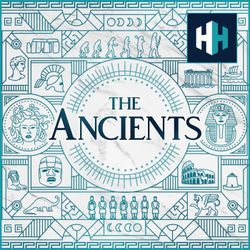
631. How to Write Cuneiform with Dr. Irving Finkel
01:00:21||Ep. 631More than 5,000 years ago, a revolutionary script emerged in the fertile lands of Mesopotamia that would transform how people counted, governed, worshipped and told stories. This was cuneiform, the world’s earliest known writing system.In this episode of The Ancients, Tristan Hughes is joined by Dr Irving Finkel to uncover how cuneiform actually worked and how you would write it yourself. From humble beginnings as simple pictograms tracking beer and grain, to the wedge-shaped signs that recorded myths, laws and epic tales long before the Bible, this episode explores how cuneiform spread across Sumer, Babylon, Assyria and Persia — and why these clay tablets remain one of archaeology’s richest windows into the ancient world.MORENoah's Ark and the FloodListen on AppleListen on Spotify The World's Oldest LettersListen on AppleListen on Spotify Watch this episode on our NEW YouTube channel: @TheAncientsPodcastPresented by Tristan Hughes. Audio editor is Aidan Lonergan. The producer is Joseph Knight. The senior producer is Anne-Marie Luff.All music courtesy of Epidemic SoundsThe Ancients is a History Hit podcast.Sign up to History Hit for hundreds of hours of original documentaries, with a new release every week. Sign up at https://www.historyhit.com/subscribe. You can take part in our listener survey here:https://insights.historyhit.com/history-hit-podcast-always-on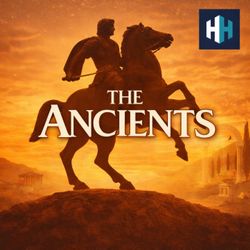
630. Alexander the Great | Rise to Power
01:24:13||Ep. 630NEW SERIES! Journey through the early life of Alexander the Great, from his education under Aristotle to his first military experiences and rise to Macedonian kingship.In this first episode, charting Alexander's incredible early life, Tristan Hughes and Dr Adrian Goldsworthy explore Alexander's formative years, the Battles that built the world's most formidable military leader and the immediate challenges following his father's assassination.MOREThe Rise of Hannibal with Adrian GoldsworthyListen on AppleListen on SpotifyDarius the Great, Persian King of KingsListen on AppleListen on SpotifyPresented by Tristan Hughes. Audio editor is Aidan Lonergan and the producer is Joseph Knight. The senior producer is Anne-Marie Luff.All music courtesy of Epidemic SoundsThe Ancients is a History Hit podcast.Sign up to History Hit for hundreds of hours of original documentaries, with a new release every week. Sign up at https://www.historyhit.com/subscribe. You can take part in our listener survey here: https://insights.historyhit.com/history-hit-podcast-always-on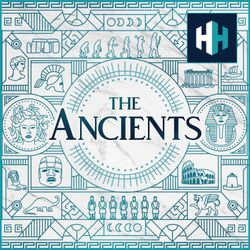
629. Adam and Eve
59:05||Ep. 629Adam and Eve: parents of humanity, or characters in a Near Eastern myth about wisdom, mortality, and the limits of being human?Tristan Hughes and Dr Dylan Johnson strip away the Sunday school varnish to re-examine the story of Adam and Eve, starting with the question: was there really an apple? They discuss the origins and multiple layers of the story, try and pinpoint where Eden might have been located, and trace the tale of lost immortality that echoes through the legends of Gilgamesh, Sumerian rivers, and the earliest biblical textsMOREMoses & The ExodusListen on Apple Listen on SpotifyThe Ark of The CovenantListen on Apple Listen on SpotifyWatch this episode on our NEW YouTube channel: @TheAncientsPodcastPresented by Tristan Hughes. Audio editor is Aidan Lonergan. The producer is Joseph Knight. The senior producer is Anne-Marie Luff.All music courtesy of Epidemic SoundsThe Ancients is a History Hit podcast.Sign up to History Hit for hundreds of hours of original documentaries, with a new release every week. Sign up at https://www.historyhit.com/subscribe. You can take part in our listener survey here:https://insights.historyhit.com/history-hit-podcast-always-on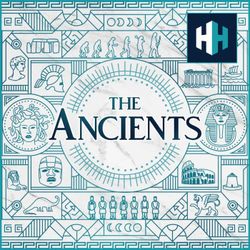
628. The First Popes
56:09||Ep. 628What do we know about the earliest Popes, and how did they shape the early Christian Church amidst persecution?Tristan Hughes is joined by Professor Rosamond McKitterick to journey back to Imperial Rome to uncover the fascinating tales of the earliest Popes, focusing on St. Peter and his possible connection to Mark's gospel, Sylvester I during Constantine's reign, and Pope Leo I who confronted Atilla the Hun.MOREJesus of NazarethListen on AppleListen on SpotifyThe Apocryphal GospelsListen on AppleListen on SpotifyPresented by Tristan Hughes. Audio editor is Aidan Lonergan and the producer is Joseph Knight. The senior producer is Anne-Marie Luff.All music courtesy of Epidemic SoundsThe Ancients is a History Hit podcast.Sign up to History Hit for hundreds of hours of original documentaries, with a new release every week. Sign up at https://www.historyhit.com/subscribe. You can take part in our listener survey here: https://insights.historyhit.com/history-hit-podcast-always-onAudio for Uploader: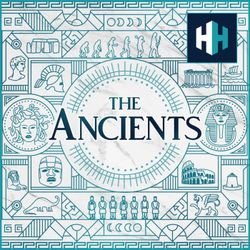
627. Xerxes the Great
55:39||Ep. 627He is one of the most famous rulers of the ancient world, remembered for leading a vast Persian invasion of Greece. Yet Xerxes the Great was far more than just a battlefield king.In this episode of The Ancients, Tristan Hughes is joined by friend of the show Professor Lloyd Llewellyn-Jones to explore the life and reign of the Persias most revered king who ruled the largest empire the world had yet seen. From his royal upbringing and court politics to religion, monumental building projects and imperial power, this episode goes beyond Greek battle narratives to uncover who Xerxes really was — and how the Achaemenid empire functioned at the height of his power.MOREDarius the Great: Persian King of KingsListen on AppleListen on SpotifyThe Persian Wars: Xerxes, Thermopylae and SalamisListen on AppleListen on SpotifyWatch this episode on our NEW YouTube channel: @TheAncientsPodcastPresented by Tristan Hughes. Audio editor is Aidan Lonergan. The producer is Joseph Knight. The senior producer is Anne-Marie Luff.All music courtesy of Epidemic SoundsThe Ancients is a History Hit podcast.Sign up to History Hit for hundreds of hours of original documentaries, with a new release every week. Sign up at https://www.historyhit.com/subscribe. You can take part in our listener survey here:https://insights.historyhit.com/history-hit-podcast-always-on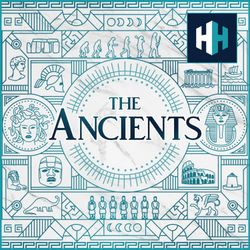
626. The Origins of Rome's Empire
58:34||Ep. 626396 BC. The city of Veii lies in ruins, destroyed by Rome in a brutal act of early imperial expansion. Yet just six years later, Rome itself would face devastation at the hands of invading Gauls, a shock that would shape the city’s identity for generations.In this episode of The Ancients, Tristan Hughes is joined by Professor Jeremy Armstrong to explore the origins of Rome’s empire. From the conquest of rival cities and the trauma of invasion to the development of Roman warfare, politics, and identity, this episode reveals how these early crises set the stage for Rome’s rise to dominance along the Tiber and beyond.MORE:The Kings of RomeListen on AppleListen on SpotifyThe Origins of Rome:Listen on AppleListen on Spotify Presented by Tristan Hughes. Audio editor and producer is Joseph Knight. The senior producer is Anne-Marie Luff.All music courtesy of Epidemic SoundsThe Ancients is a History Hit podcast.Sign up to History Hit for hundreds of hours of original documentaries, with a new release every week. Sign up at https://www.historyhit.com/subscribe.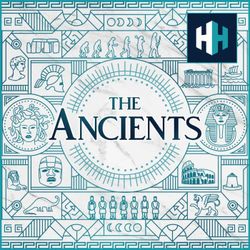
625. The First Arabians
50:58||Ep. 625What can ancient DNA tell us about the first homo sapiens to arrive in Arabia over 50,000 years ago? Tristan Hughes is joined by Prof. Pierre Zalloua to delve into the groundbreaking advances in ancient DNA research that illuminate the complex journeys of these early human populations. They discuss the challenges of extracting ancient DNA in harsh desert environments, the role of climate in human migration, and the archeological evidence of early human presence which show continuous population movements over millennia.MOREThe Rise of HumansListen on AppleListen on SpotifyThe Kingdom of KushListen on AppleListen on SpotifyWatch this episode on our YouTube channel: @TheAncientsPodcastPresented by Tristan Hughes. Audio editor is Aidan Lonergan. The producer is Joseph Knight. The senior producer is Anne-Marie Luff.All music courtesy of Epidemic SoundsThe Ancients is a History Hit podcast.Sign up to History Hit for hundreds of hours of original documentaries, with a new release every week. Sign up at https://www.historyhit.com/subscribe. You can take part in our listener survey here:https://insights.historyhit.com/history-hit-podcast-always-on
624. After Ancients: Frances McIntosh
22:10||Ep. 624In this exclusive subscriber-only episode, Tristan Hughes sits down with the 'Master of the Wall' archeologist Dr. Frances McIntosh to discuss her incredible work as Collections Curator for Hadrian's Wall and her favourite finds.Presented by Tristan Hughes. Audio editor and producer is Joseph Knight. The senior producer is Anne-Marie Luff.All music courtesy of Epidemic SoundsThe Ancients is a History Hit podcast.Sign up to History Hit for hundreds of hours of original documentaries, with a new release every week. Sign up at https://www.historyhit.com/subscribe. You can take part in our listener survey here: https://insights.historyhit.com/history-hit-podcast-always-on